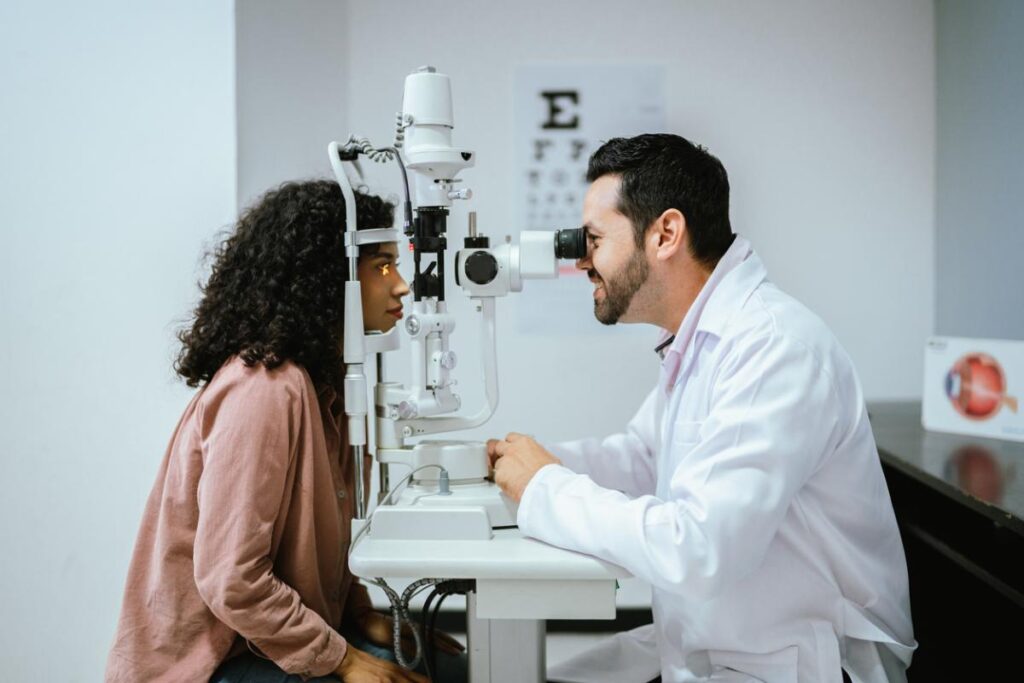The Texas Optometry Board (“the Board”) is the state agency that handles licensing and disciplinary matters for optometrists in Texas. Unfortunately, patients, colleagues, and other third parties can report alleged misconduct by optometrists, like all professionals, for alleged misconduct. Complaints handled by the Board may involve any of the rules and laws governing optometrists, including those that involve advertising.
Even if the complaint has no merit, receiving a complaint from the Board can be highly stressful. The possibility of significant sanctions that adversely affect your career, including losing your license, makes the stakes high in disciplinary proceedings. Fortunately, your Texas optometrist license defense attorneys are here to help you devise the best strategy to defend yourself in any disciplinary proceedings that you may face.
False, Deceptive, or Misleading Advertising
Tex. Occ. Code §351.403 states that optometrists may not publish or display by any means “a false, deceptive, or misleading statement or advertisement concerning ophthalmic services or materials.” Ophthalmic services are defined as “lenses, frames, eyeglasses, or contact lenses, or parts of lenses, frames, eyeglasses, or contact lenses.”
Advertisements for eyeglasses or contact lenses must contain language stating that a prescription from an eye doctor is required to purchase prescription eyeglasses or contact lenses.
Furthermore, all advertisements concerning the price of eyeglasses or contact lenses must contain the following information:
- a statement of whether the cost of an examination, prescription services, and follow-up care by an eye doctor is included in the price;
- if the advertised goods are to be available to the public at the advertised price for less than 30 days after the date of publication of the advertisement, a statement of the time limitation on the offer;
- if the advertised goods are to be available to the public in limited quantities and if no rainchecks are to be given on total depletion of the inventory of the advertised goods, a statement of the total quantity available to all customers;
- if the advertised goods are to be available to the public at a limited number for each customer, a statement of the limit for each customer; and
- for contact lenses, a statement of the number of lenses included for the price specified.
All the above required information must be easily readable or audible by a person of average comprehension or reading speed.
Professional Designations
Under Tex. Occ. Code §104.003(f), anyone who uses a person’s name or signature on written or printed professional identifications, including signs, pamphlets, stationery, letterhead, must use one of the following designations:
- optometrist;
- doctor, optometrist;
- doctor of optometry; or
- O.D.
Furthermore, a therapeutic optometrist must use the designation of “doctor, therapeutic optometrist”, or “therapeutic optometrist”.
On the other hand, an optometric glaucoma specialist may not use the phrase “optometric glaucoma specialist” as a professional designation. Nonetheless, an optometric glaucoma specialist can use the designations “O.D., optometric glaucoma specialist,” or “therapeutic optometrist, optometric glaucoma specialist.”
Specialization
Optometrists may advertise themselves as specializing in a certain type of treatment or patient. However, they may not use the term “specialist” unless they also include the name of the entity conferring the specialty designation. An example of such an entity is the North American Contact Lens Foundation, which certifies optometrists as “contact lens specialists.”
Certification
The Board does not certify optometrists, so individuals may not advertise that they are “certified” by the Board. Again, optometrists may advertise any professional certifications that they hold, so long as the advertisement also contains
Free Eyeglasses, Contact Lenses, or Eye Exams
Under Tex. Occ. Code §351.404, optometrists may not give or deliver, or cause to be delivered, eyeglasses as a prize or premium, or as an inducement to sell an item of merchandise. However, optometrists may advertise eyeglasses as “buy one, get one free.” Optometrists also may provide free eyeglasses and/or eye exams for a charity.
Furthermore, optometrists may advertise free eye exams, as long as they meet the restrictions outlined in Tex. Occ. Code §351.403 to avoid being false or misleading advertisements.
Leasing Space
Tex. Occ. Code §351.459 allows optometrists to lease space from and practice optometry on the premises of a mercantile establishment. Tex. Occ. Code §351.63 further provides “every phase of the practice and the leased space of the optometric practice must be controlled exclusively by an optometrist or therapeutic optometrist.” The practice also must be exclusively owned by the optometrist and maintained as a separate space from the space used by other occupants of the premises.
Optometrists who lease from mercantile establishments also must comply with certain advertising-related restrictions, such as refraining from:
- Conducting a phase of practice as a department or concession of the mercantile establishment;
- Displaying the words “Optical Department,” “Optometrical Department,” or similar words on the premises of the mercantile establishment or in advertising; and
- Permitting the optometrist’s name or practice to be used directly or indirectly in connection with the mercantile establishment in any manner, including in advertising.
Credit accounts for a patient must be maintained with the optometrist, not with the mercantile establishment.
Likewise, optometrists who lease space from an optical must comply with similar advertising restrictions. A retailer of ophthalmic goods may not control or attempt to control the practice of an optometrist, including influencing professional fees or office hours or restricting the ability of the optometrist to see patients by appointment. Tex. Occ. Code §351.408. Other actions defined as controlling or attempting to control an optometrist’s practice include:
- terminating or threatening to terminate a lease or other contract with the optometrist in an attempt to control their practice in some manner;
- providing, hiring, or sharing employees, business services, or similar items; and
- making or guaranteeing a loan in excess of the value of the collateral securing the loan.
Similarly, a manufacturer, wholesaler, or retailer of ophthalmic goods may not directly or indirectly:
- control or attempt to control the professional judgment, manner of practice, or practice of an optometrist or therapeutic optometrist;
- employ or contract for the services of an optometrist or therapeutic optometrist if part of the optometrist’s or therapeutic optometrist’s duties involves the practice of optometry or therapeutic optometry; or
- pay an optometrist or therapeutic optometrist for a service not provided.
Get the Advice You Need About Your Optometrist License
When you face a disciplinary complaint concerning your optometrist license, you risk losing your career, your reputation, and your means of financial support. Don’t try to handle such a critical situation on your own. The optometrist license defense lawyers at Bertolino LLP can look at your circumstances and help you determine the most effective means of protecting your license. Call us today at (512) 980-3751 or get more information about us online.
Call or text (512) 476-5757 or complete a Case Evaluation form






